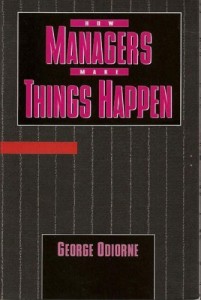In Part 1 of this article series, we addressed the fact that many fine recruiters have extreme difficulty making the transition from “salesman to manager” when they decide to take on those different responsibilities. The reason for this is that they forget the many long years of concentration, study and practice involved in learning how to “work a desk,” and presume that their skills enable them to automatically become an effective manager.
The Answer
The best way to become quickly knowledgeable about the practice of management is to undertake a study of those practices – and this is most easily achieved by purchasing, reading, underlining, and implementing the books that have proven to contain the requisite information.
While the field of “management books” is vast, the following are brief summaries of some of the best of them. These books are clear, concise and highly appropriate to our industry. If a book should be out of print, Amazon probably has it used.
In Part 1, we briefly reviewed two excellent books on management; the following are two more.
Managing – by Harold Geneen
Has there ever been a master of professional business management like Harold Geneen? Maybe. But outside of Peter Drucker, you’d be hard-pressed to find him. Drucker, of course, is a consultant; Geneen just goes out and does it.
Try this. He took over ITT when it was a faltering $766 million corporation. When he left seventeen years later, sales were at $22 billion, the 9th largest firm in the world! Profits? From $29 million to $562 million. Increased earnings for 58 consecutive quarters! The man is a legend. But more that that – “Geneen University,” as ITT was dubbed, spawned a host of top-flight executives who transferred Geneen’s culture of accountability, success, achievement, enthusiasm, and creativity to their own firms. Hal Geneen wasn’t a genius. He was a leader with a system. And he spells out that system in this remarkably lucid book on real-world managing.
For those who think that building a giant corporation is so divorced from their business that there is nothing to be learned, Geneen’s blunt, honest irrefutable home truths – “inspiring doses of good sense,” wrote the New York Times – will change your mind. Buy and underline this book. You can learn to manage effectively. Geneen will show you how.
How Managers Make Things Happen – George Odiorne
Profe ssor George Odiorne is now to the field of training what Peter Drucker is to management – a legendary figure who has single-handedly created a segment of life that radically altered our society for the better.
ssor George Odiorne is now to the field of training what Peter Drucker is to management – a legendary figure who has single-handedly created a segment of life that radically altered our society for the better.
But in 1961, he was just George Odiorne, former manager with American Can and General Mills, then instructor at Rutgers, and now with the American Management Association. That year, George Odiorne wrote his first book – on management. It is quite possibly the finest and most specific book ever written on the subject. This is it.
The book is realistic, straightforward, and well-written. In 21 chapters it defines the topics, explains the benefits of learning the material, and then states the exact steps and rules of implementing the procedure. Odiorne’s “Ten Rules of Identifying Business Stagnation” will cause many managers to wince – and then he tells them how to change that stagnation. His extensive chapter on management discipline of subordinates deals masterfully with an important, sensitive, and rarely discussed management skill. The sections on “Rigid Managers – How to Make Them More Flexible” and “Harnessing Aggressiveness in Management” should be read by many in our industry. “Coaching a Winning Management Team” with his ten rules for good coaching is excellent.
Robert Louis Stevenson once said of a particular essay that it was “so good there should be a tax on those who had not read it.” Those managers or aspiring managers who have not read and absorbed this flawless work are paying a tax – reduced profits. Join the Tax Rebellion. Read this book. Study it. Abolish marginal performance. Odiorne will show you how.
To know the sales portion of your business – whether permanent, temp, or contract – is obviously necessary to generate personal revenue. The ability to transfer those skills to others, then develop and supervise those new people, however, requires a very different body of knowledge. Unless sufficient time and effort is taken to accumulate that knowledge, frustration and failure await. These books contain the information you must have to grow your firm quickly, profitably, and well.
Main image source: Royalty-Free/Corbis
